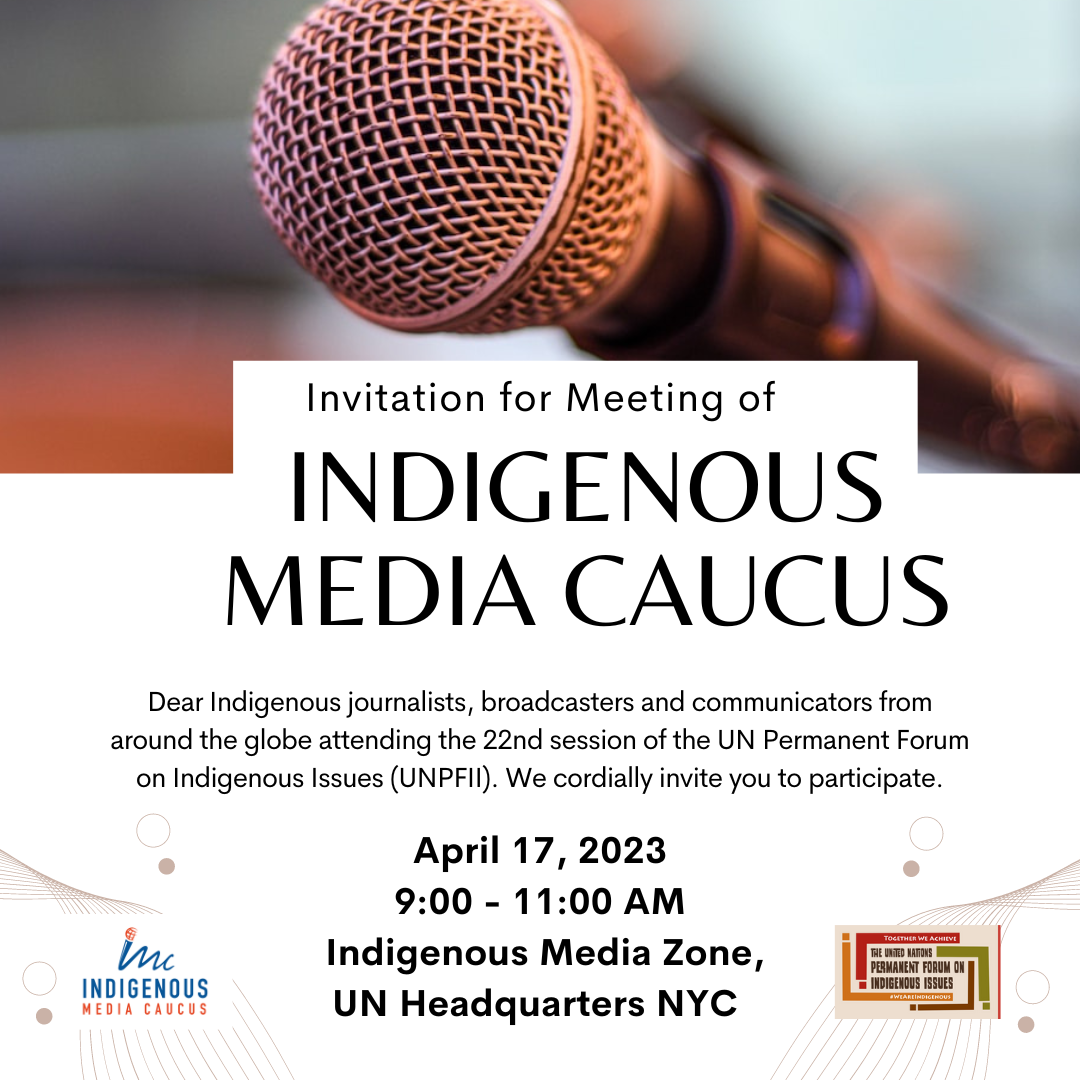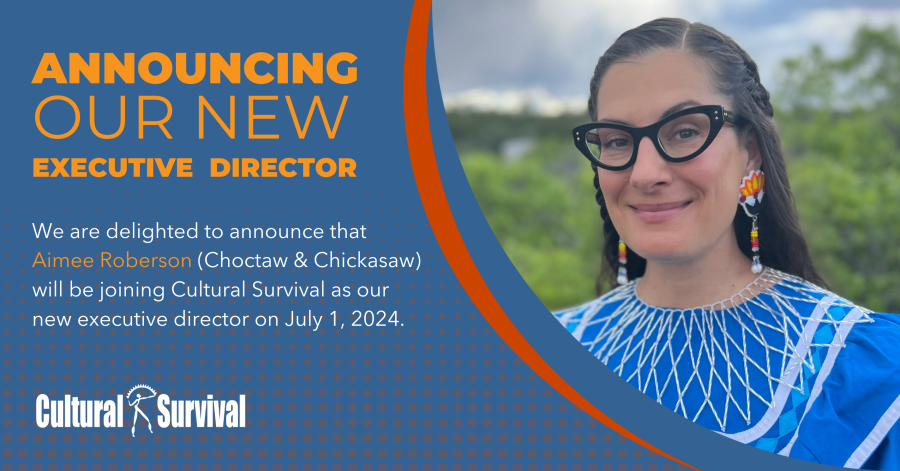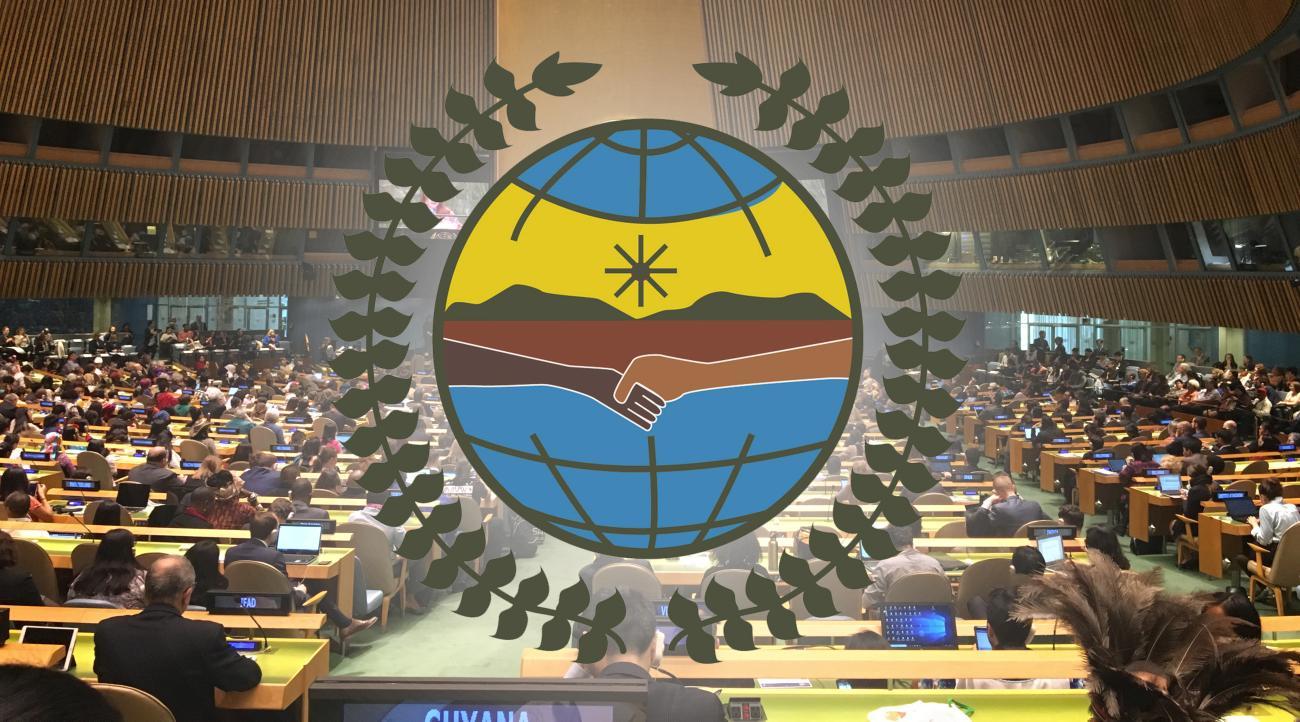
On April 17-28, 2023, the 22nd session of the United Nations Permanent Forum on Indigenous Issues (UNPFII) will take place. This year’s session theme will focus on “Indigenous Peoples, human health, planetary and territorial health and climate change: a rights-based approach."
After decades of Indigenous leaders pushing for inclusion and representation at the United Nations, on July 28, 2000, the UNPFII was established as a high-level advisory body to the UN Economic and Social Council by resolution 2000/22. Since 2002, the UNPFII has been meeting annually.
The UNPFII can be utilized by Indigenous Peoples to raise awareness, bring policy change to other UN bodies, and influence how Indigenous rights are implemented at the local and national levels. Over the past 22 years, the UNPFII has coordinated and commissioned over 78 studies, 51 reports, and over 62 publications. Members of the Forum have worked on drafting policies for UN agencies and have made recommendations to other UN bodies.
Some of the greatest achievements over the past two decades have been the networking and alliances built among Indigenous delegates and representatives from all over the world. The relationships, partnerships, and friendships built are core to the global Indigenous rights movement. Aside from the official talks, interventions, panels, official side events, and parallel events, what really also needs to be elevated are the side conversations in the hallways between delegations, UN agencies, funders, and State representatives. This is where true change happens.
Join us in amplifying Indigenous Peoples' voices this year at UNPFII with a series of events and opportunities below.
1. Join the conversation!
What are the pressing issues affecting your Indigenous community?
Create a short video (up to 2 minutes) and post it on Twitter and Facebook using #UNPFII22 #WeAreIndigenous #Proud2BIndigenous.
Share your photos from this year's and the past UNPFIIs using the same hashtags.
2. Watch the Livestream of the UNPFII.
Opening ceremony of the Forum will be streamed at webtv.un.org.
Monday, April 17, 2023, 11:00 AM - 1:00 PM ET
3. Attend a UNPFII side event.
The full list of side events will be posted here.
Join Cultural Survival at these events below:
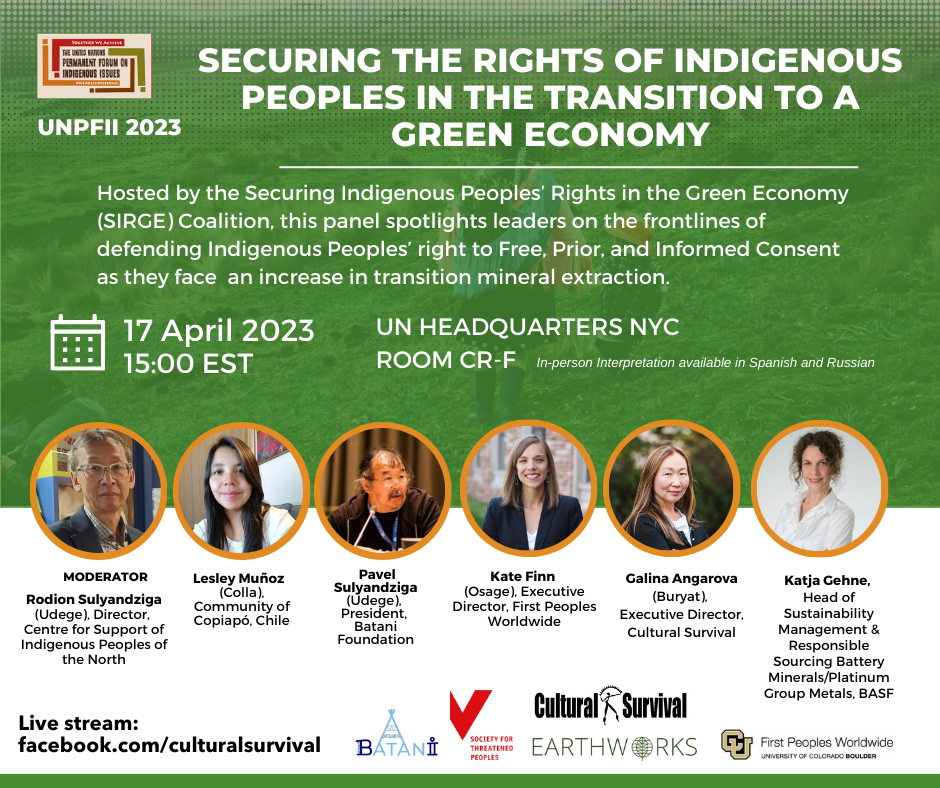
Securing the Rights of Indigenous Peoples in the Transition to a Green Economy
Monday April 17, 2023
15:00 - 16:15 EST
UN Headquarters in NYC
Room CR-F
Hosted by Cultural Survival, First Peoples Worldwide, Batani Foundation, Earthworks, and Society for Threatened Peoples, who compose the global, Indigenous-led Securing Indigenous Peoples’ Rights in the Green Economy (SIRGE) Coalition, this panel spotlights leaders on the frontlines of defending Indigenous Peoples’ right to Free, Prior, and Informed Consent as they face an increase in transition mineral extraction. Indigenous leaders will discuss how an increase in mining for transition minerals puts Indigenous Peoples’ and all people’s health, as well as the health of their territories and the planet as a whole, at risk. It will map the global landscape of transition mineral development and share pathways towards a just transition, grounded in a rights-based approach, that protects the rights of Indigenous Peoples.
CO-SPONSORS: First Peoples Worldwide, Batani Foundation, Earthworks, and Society for Threatened Peoples and Cultural Survival
SALT Workshop: Protecting Territorial Health and the Rights of Indigenous Peoples through Shareholder Advocacy
Tuesday, April 18, 2023, 4:30-5:45 pm ET - REGISTER
Location: 405 E 42nd St, New York, NY 10017, United Nations General Assembly Building Room CR-5
This Shareholder Advocacy Leadership Training (SALT) workshop offers practical tools for Indigenous leaders to pursue market-based advocacy options to protect communities, resources, sacred places, and cultural practices.,Participants will learn how to mobilize strategies to target companies proposing harmful projects, examine case studies that make the business case for Indigenous Peoples’ rights, and hear directly from Indigenous and investor leadership with a proven track record of creating positive outcomes through corporate engagement.
This side event of the United Nations Permanent Forum on Indigenous Issues Twenty-Second Session is presented by First Peoples Worldwide, which has worked alongside Indigenous Peoples and investors to support rights-centered shareholder advocacy for over two decades, and co-sponsored with the Gwich’in Steering Committee and Cultural Survival, this workshop is for all advocates working to build the business case for free, prior, and informed consent (FPIC).
3. Follow Discussions from the Indigenous Media Zone.
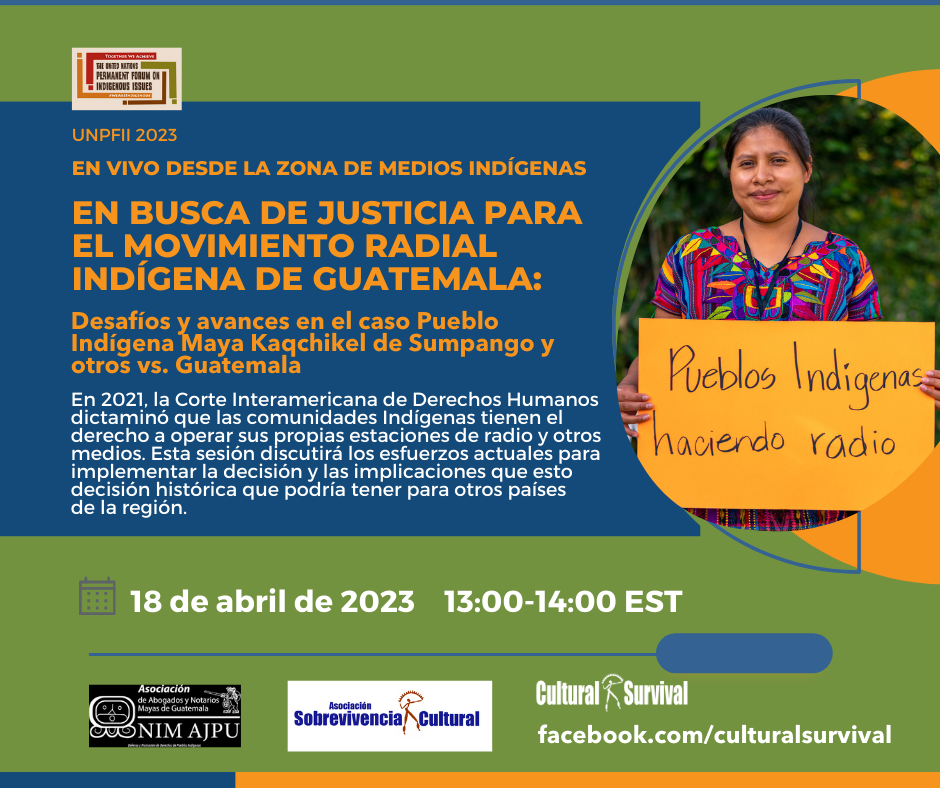
En busca de justicia para el movimiento radial indígena de Guatemala: Desafíos y avances en el caso Pueblo Indígena Maya Kaqchikel de Sumpango y otros v. Guatemala
18 de abril de 2023
13:00-14:00
Zona de Medios Indígenas/ facebook.com/culturalsurvival
En 2021, la Corte Interamericana de Derechos Humanos dictaminó que las comunidades indígenas tienen el derecho a operar sus propias estaciones de radio y otros medios, lo cual es consistente con el Artículo 16 de la UNDRIP. Esta sesión discutirá los esfuerzos actuales para implementar la decisión y las implicaciones que esto decisión histórica que podría tener para otros países de la región.
CO-PATROCINADORES:
Cultural Survival, Asociación de Abogados Mayas de Guatemala NIM AJPU, Sobrevivencia Cultural
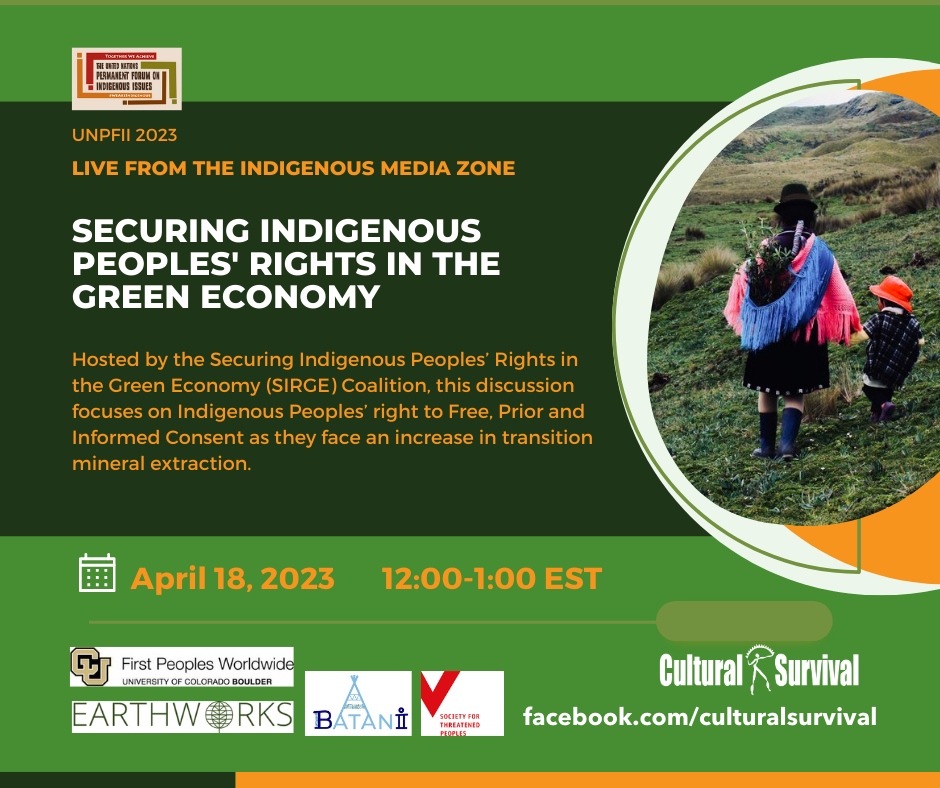
Securing the Rights of Indigenous Peoples in the Transition to a Green Economy
Tuesday, April 18, 2023
12:00 - 1:00 PM EST
Indigenous Media Zone/ facebook.com/culturalsurvival
Hosted by Cultural Survival, First Peoples Worldwide, Batani Foundation, Earthworks, and Society for Threatened Peoples, who compose the global, Indigenous-led Securing Indigenous Peoples’ Rights in the Green Economy (SIRGE) Coalition, this panel spotlights leaders on the frontlines of defending Indigenous Peoples’ right to Free, Prior and Informed Consent as they face an increase in transition mineral extraction. Indigenous leaders will discuss how an increase in mining for transition minerals puts Indigenous Peoples’ and all people’s health, as well as the health of their territories and the planet as a whole, at risk. It will map the global landscape of transition mineral development and share pathways towards a just transition, grounded in a rights-based approach, that protects the rights of Indigenous Peoples.
CO-SPONSORS: First Peoples Worldwide, Batani Foundation, Earthworks, and Society for Threatened Peoples and Cultural Survival
Indigenous Leadership: Transmitting FPIC Priorities to the Private Sector
Wednesday, April 19, 11:00 am-Noon ET - REGISTER
Location: Indigenous Media Zone, UN Correspondents Association Room (3rd floor, Secretariat building, S-310), United Nations Headquarters, 46th Street and First Ave, New York, NY 10017, New York City
Taking place in tandem with the United Nations Permanent Forum on Indigenous Issues' Twenty-second Session, this conversation highlights FPIC as it has been defined and implemented by Indigenous Peoples. Indigenous leadership from various geographical regions will share their experiences, discuss practices and protocols that have worked for their communities, and explain how they have navigated the action and policies of corporations and State actors to ensure their rights and well-being are protected. This roundtable will be broadcast so interested investors can hear directly from Indigenous leaders about their experiences and expertise on FPIC.
Co-presented by First Peoples Worldwide and Cultural Survival, this roundtable takes place at the Indigenous Media Zone during the United Nations Permanent Forum on Indigenous Issues' Twenty-second Session. For those unable to attend in person, this event will be broadcast via Zoom. Please register below to receive a link and to receive additional resources and follow-up materials.
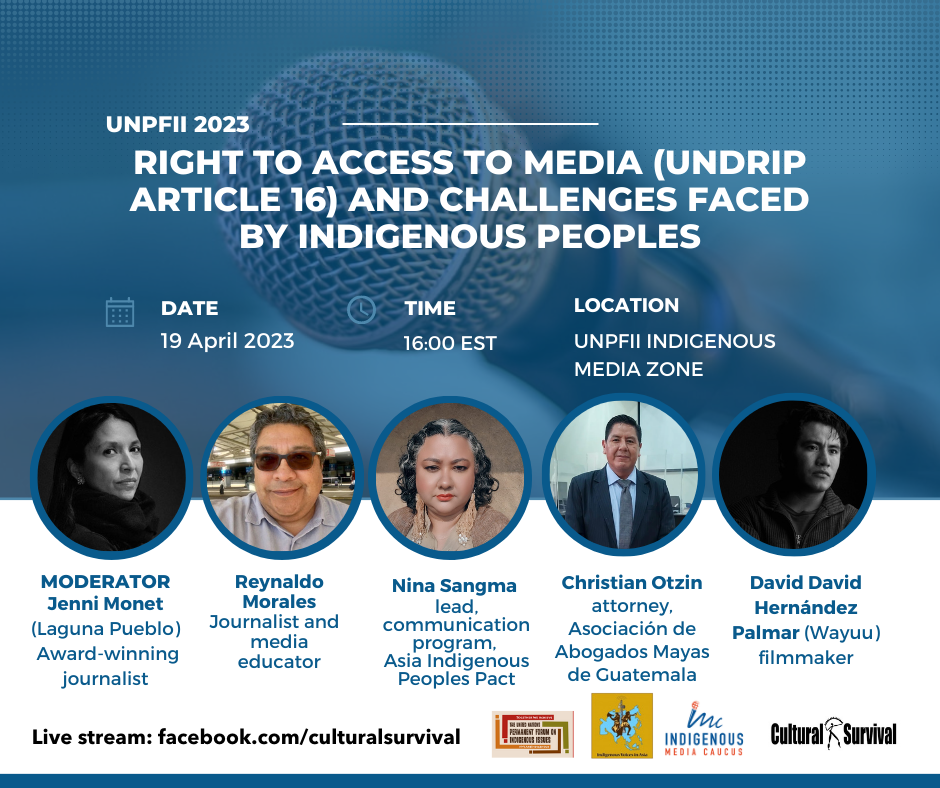
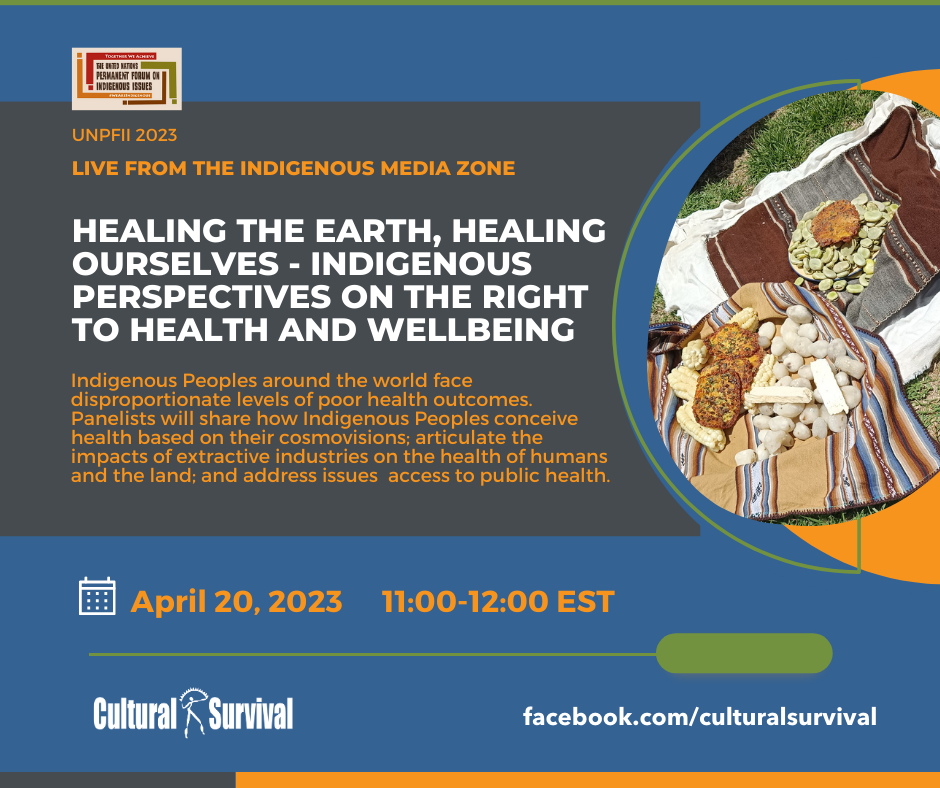
Healing the Earth, Healing Ourselves - Indigenous Perspectives on the Right to Health and Wellbeing
Thursday, April 20, 2023
11:00 AM - 12:00 PM EST
Indigenous Media Zone / facebook.com/culturalsurvival.org
Indigenous Peoples around the world face disproportionate levels of poor health outcomes compared to non-Indigenous co-nationals. This is determined and compounded by structural racism and discrimination and results in Indigenous Peoples experiencing high rates of maternal and infant mortality, malnutrition, cardiovascular illnesses, HIV/AIDS, and other infectious diseases such as malaria and tuberculosis, among many others. In addition to existing poor health conditions, the threat has worsened due to the impacts of extractive industries, which are constantly increasing in Indigenous territories.
This session will share how Indigenous Peoples conceive health based on their cosmovisions; articulate the impacts of extractive industries on the health of humans and the land; and address issues of Indigenous Peoples’ access to public health.
CO-SPONSORS: Cultural Survival
4. Attend a Parallel Event
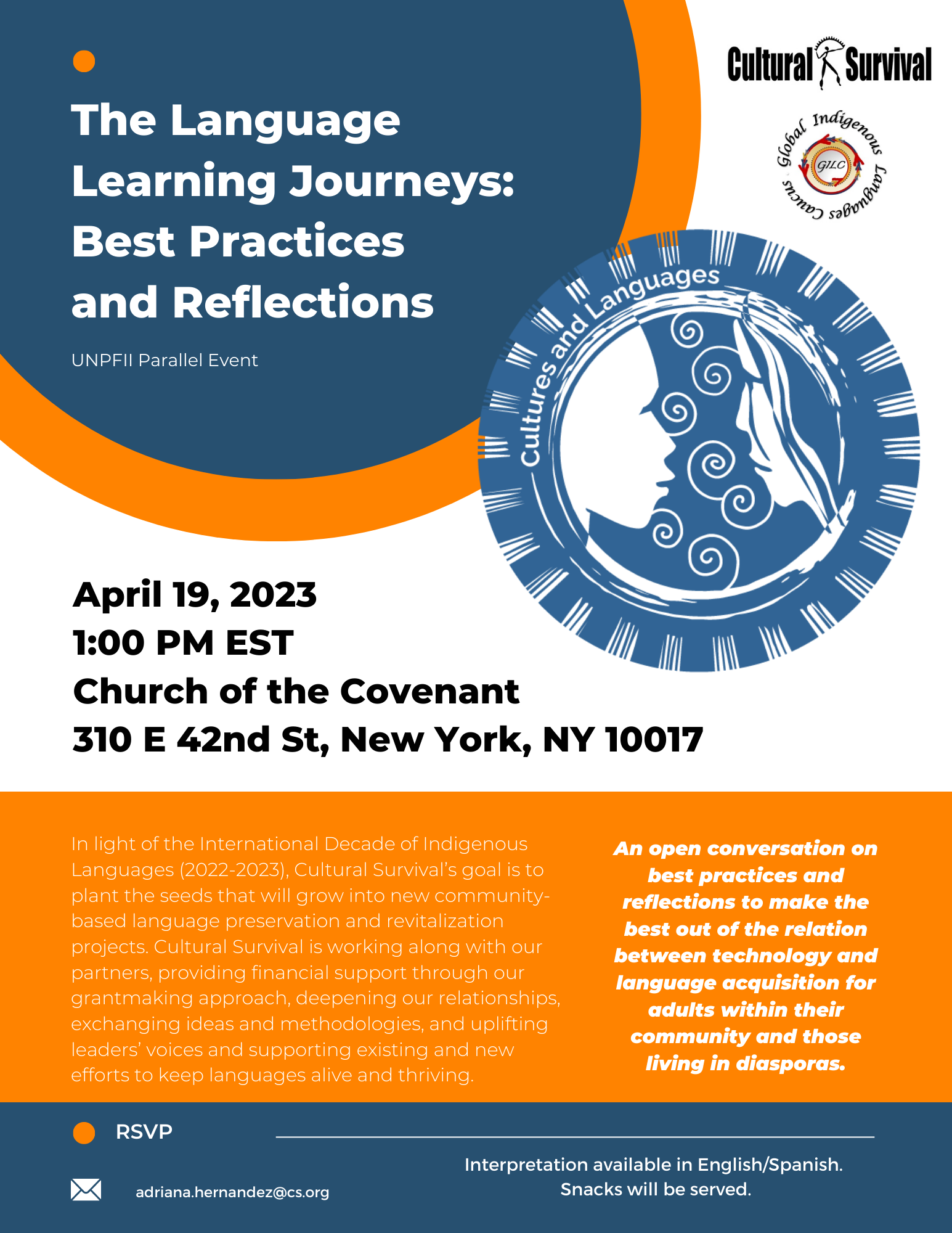
The Language Learning Journey: Best Practices and Reflections
Wednesday, April 19, 2023 1:00 PM EST
Church of the Covenant, 310 E 42nd St, New York, NY 10017
Snacks will be served
In light of the International Decade of Indigenous Languages (2022-2023), Cultural Survival’s goal is to plant the seeds that will grow into new community-based language preservation and revitalization projects. Cultural Survival is working along with our partners, providing financial support through our grantmaking approach, deepening our relationships, exchanging ideas and methodologies, and uplifting leaders’ voices and supporting existing and new efforts to keep languages alive and thriving.
As a result of the displacement, violence, racism and lack of opportunities for a sustainable life, many members from Indigenous communities have been forced to migrate to the United States and other countries. Many of these adults and their children, did not learn their languages at home want to learn their languages and want the same for theirchildren. Cultural Survival is hosting an open conversation on best practices and reflections to make the best out of the relation between technology and language acquisition for adults within their community and those living in diasporas.
Speakers:
- Kaimana Barcarse (Kanaka Hawaiʻi). Lead DJ of the Hawaiian language program "Alana I Kai Hikina" on KWXX-FM, the Hawaiʻi Island member of the state Board of Education, and the West Hawai’i Regional Director for Kamehameha Schools, Board Chair of Cultural Survival
- Verónica Aguilar (Mixtec), Keepers of the Earth Program Assistant, Cultural Survival
- Kseniia Bolshakova (Dolgan). Dolgan language activist and writer
- Karina Sheifer. Research scholar at Dartmouth College and Laboratory for study and preservation of minority languages of Russian Academy of Sciences, field linguist
- šitétkʷ (Water Leader) (Spokane), Executive Assistant at Spokane Language House
- Avexnim Cojti (Maya K'iche'), Director of Programs, Cultural Survival
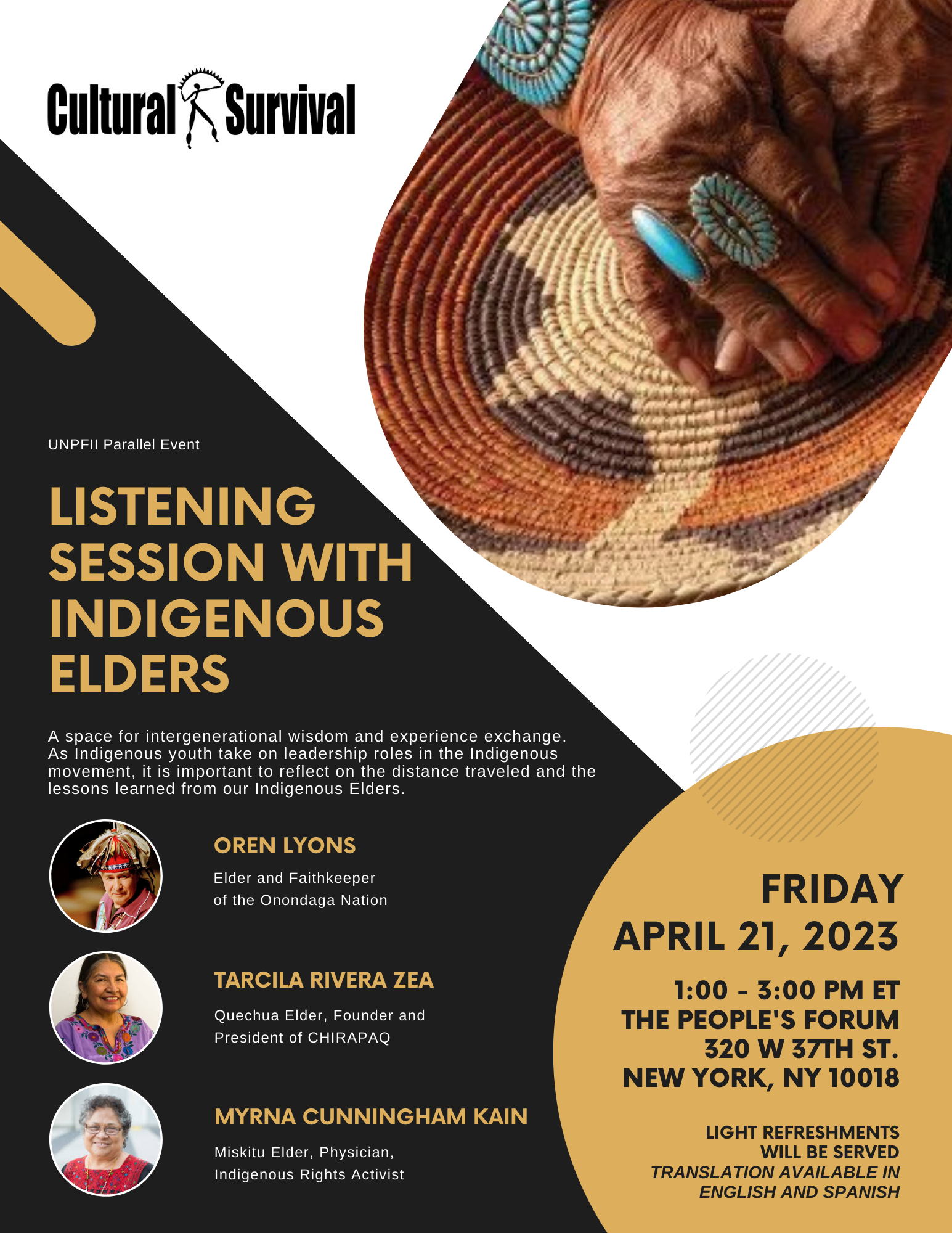
Listening Session with Indigenous Elders
Friday, April 21, 2023
1:00 - 3:00 PM EST
The People’s Forum - Mezzanine Level
320 W 37th St.
New York, NY 10018
Light refreshments will be served.
Through this session we hope to provide a space for intergenerational wisdom and experience exchange. As Indigenous youth take on leadership roles in the Indigenous movement, it is important to reflect on the distance traveled and the lessons learned from our Indigenous elders. The Indigenous movement has achieved so much in the last decades, and all this progress would not have been possible without the work of our Indigenous elders. Yet a great deal of work is ahead of us and Indigenous youth must continue this work rooted in Indigenous values.
Speakers:
Oren Lyons, Elder and Faithkeeper of the Onondaga Nation
Tarcila Rivera Zea, Quechua Elder, Founder and President of CHIRAPAQ
Myrna Cunningham Kain, Miskitu Elder, Physician, and Indigenous Rights Activist
Interpretation available in Spanish and English.
